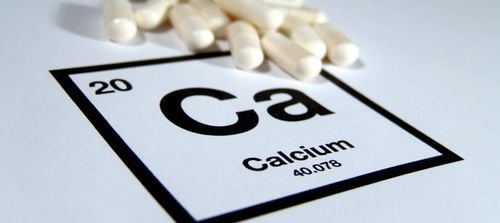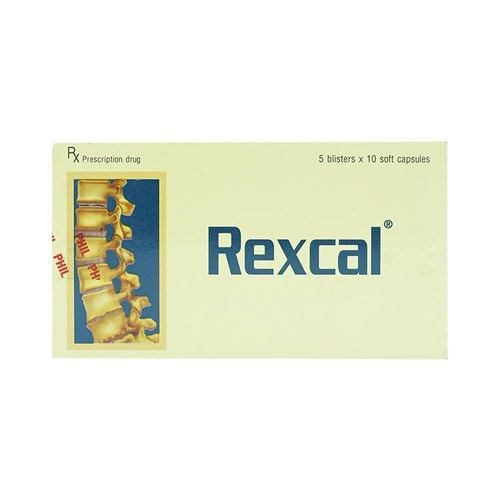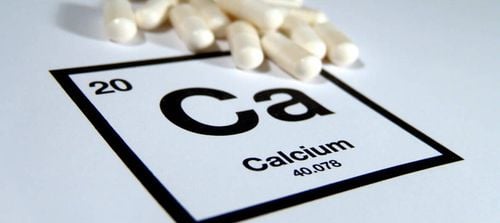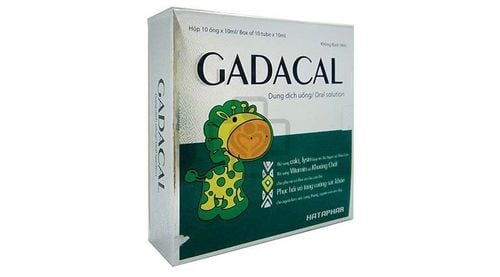This is an automatically translated article.
Calcium plays an important role in body parts such as bones, nervous system, muscles and immune system... However, too much calcium will cause very dangerous diseases such as kidney stones. , hyperthyroidism, digestive disorders...
1. The role of calcium
Calcium is the most important component, accounting for about 70% of bone weight, helping bones develop and grow taller. For the nervous system, calcium participates in the activity of the pituitary gland, ensuring the transmission of information between nerve cells and between nerve cells and other cells.Calcium is very important for muscle movement, heart muscle, smooth muscle helps maintain heart beat, blood clotting and metabolic functioning of organs. In addition, calcium also participates in the process of destroying pathogens that enter the body.

Canxi là thành phần quan trọng nhất, chiếm khoảng 70% trọng lượng xương.
2. What disease does calcium deficiency cause?
Calcium has a very important role like Vitamin D3 to help support calcium absorption and metabolism into the body. Exposure to sunlight allows the body to synthesize vitamin D3 to supplement calcium. Therefore, calcium deficiency causes rickets, slow growth even after entering puberty, and for the elderly, it will cause osteoporosis and bone and joint-related diseases, especially in women at the early age. menopause period.
The main cause is due to malnutrition or deficiency due to calcium metabolism disorders or the body's difficulty in absorption. The signs are easy to see such as weak bones, teeth, brittle nails, easily broken, weakened immune system, fatigue, stress, insomnia.
3. How to supplement calcium?
Calcium supplements for people with increased calcium needs such as pregnant and lactating women to help support strong bones and teeth. Adequate calcium supply will support children to enhance development, prevent rickets as well as prevent osteoporosis in the elderly. Foods rich in calcium are field crabs, fresh rice straw, shrimps, shrimps, snails, fresh fish, scallops... These calcium-rich foods provide easily absorbed organic calcium.
Some vegetables are rich in calcium such as laksa leaves, wood ear, celery. In some cases, poor absorption of calcium requires oral supplementation. The amount of calcium needed to absorb into the body in a day varies depending on gender, male or female and depending on children or adults. Therefore, supplementing with calcium by eating foods containing calcium content is just enough, properly and scientifically. On the other hand, to provide an adequate amount of calcium, you should also increase movement, exercise in the morning, drink milk, eat well without skipping meals.
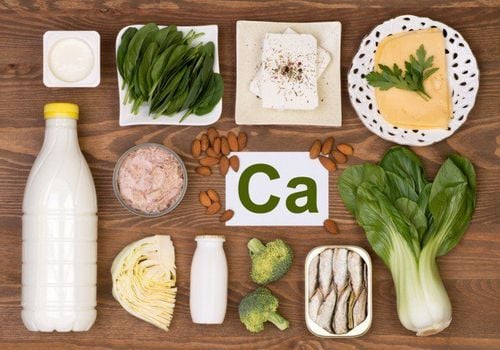
Bổ sung canxi bằng cách ăn những thực phẩm chứa hàm lượng này.
4. Excess calcium causes what disease?
Too much calcium also makes children suffer from extremely dangerous diseases, the normal infant's calcium requirement is 300mg per day, 500mg when the child is 9 months old. When using more than 2000mg of calcium plus 1000mg of vitamin D for children under 1 year old, children will have excess calcium causing thirst, more urination, constipation or defecation, vomiting, heart rhythm disturbances, fatigue Fatigue, loss of appetite, early ossification can cause low height, arterial calcification
Excess calcium causes hyperthyroidism: If the parathyroid gland is stimulated by calcium deficiency, the parathyroid gland must continuously secrete many hormones to make Parathyroid gland function is working beyond the limit and can no longer control blood calcium levels, blood calcium levels at this time increase, leading to arrhythmias, forcing the thyroid gland to secrete hormones to reduce calcium levels. in the blood and transfer the excess calcium out. The parathyroid glands are responsible for controlling the amount of calcium and phosphorus in the body. When parathyroid hormone is produced in large amounts, there is an increased risk of hyperthyroidism due to excess calcium.
Excess calcium causes cardiovascular diseases: Blood calcium disorders and heart rhythm disturbances. Due to the large amount of calcium release many different hormones that cause heart attacks affecting the cardiovascular system. Excess calcium reduces the body's absorption of nutrients: Too much calcium will cause iron deficiency and zinc reduces the body's activity, causing low blood pressure and irregular heartbeat, affecting the absorption of nutrients by cells. cause kidney stone disease: When the body has excess calcium, it will be excreted in the urine, overloading the kidneys, calcifying the risk of ureteral stones, kidney stones. The disease needs to be treated promptly or there will be serious consequences. Excess calcium causes digestive disorders: When eating is no longer appetizing, abdominal pain, diarrhea, sometimes constipation, it may be due to too much calcium supplementation. Thus, calcium is an indispensable ingredient in the growth and development. holistic development of children from birth. For children under 6 months of age should be exclusively breastfed, calcium will be obtained from breast milk. For children over 6 months old, in addition to breast milk, calcium can be supplemented through their daily diet with calcium-rich products such as fresh milk, cheese, green vegetables such as broccoli, kale because they are rich in calcium. Good for children's development.
Let children sunbathe to supplement vitamin D to help them absorb calcium better so that they have a healthy body. However, also consider, learn and consult with experts to avoid the case of too much calcium supplementation, which easily causes dangerous diseases affecting health.
Please dial HOTLINE for more information or register for an appointment HERE. Download MyVinmec app to make appointments faster and to manage your bookings easily.




